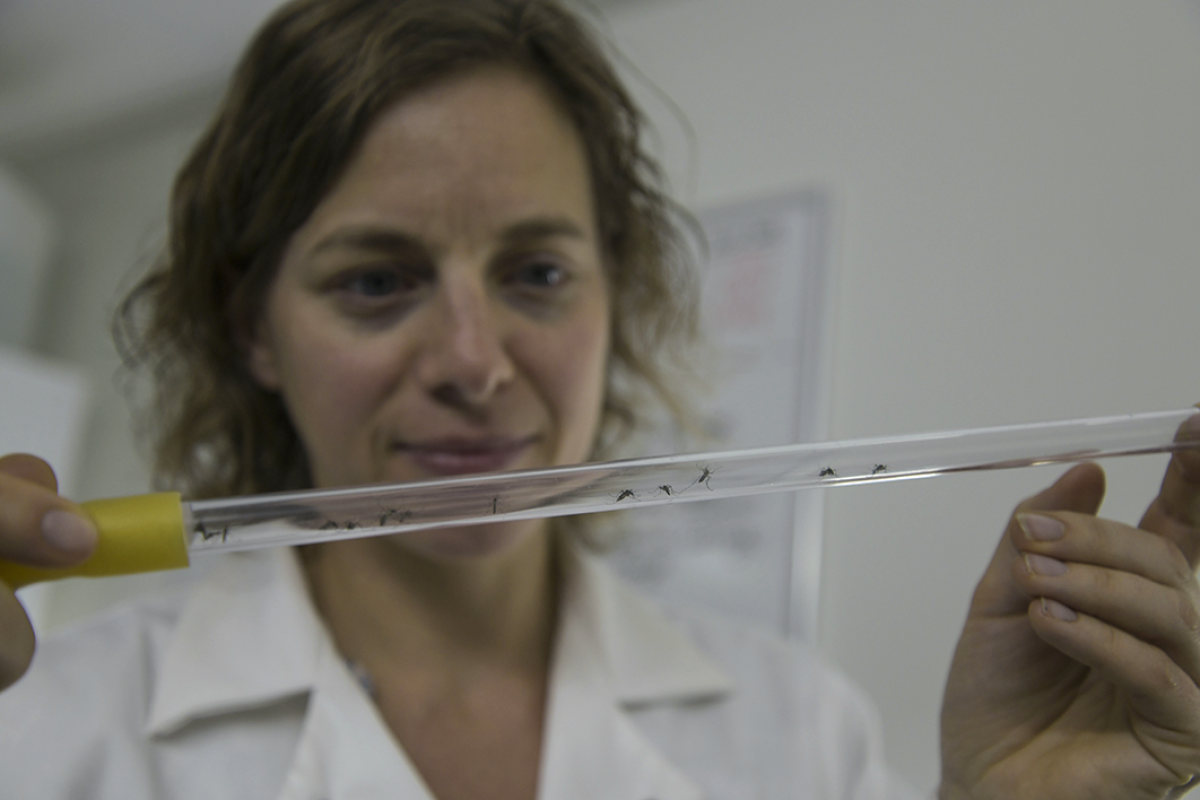This year, the Associated Students of Arizona State University and the Graduate and Professional Student Association received a record 93 applications for the Centennial Professorship Award, an award given annually that recognizes and encourages Arizona State University faculty for outstanding leadership and instruction.
One of this year’s award recipients, Silvie Huijben, assistant professor at ASU’s Center for Evolution and Medicine, has found that teaching and mentoring students has brought a new sense of purpose to her work.
"Most knowledge has an expiration date, while critical thinking is needed for the rest of one’s life,” Huijben said. “I strive to teach my students how important the role of evolution is in many aspects of their lives. I aim to inspire them to ask big questions about the world around them. My ambition in teaching is to plant the seed of questioning — a practice that they will continue to use outside of the classroom.”
Spending years using evolutionary biology to study malaria around the globe, Huijben has traveled everywhere from Kenya and Barcelona, Spain, to Scotland and Pennsylvania. Today, she continues this work in her position at ASU’s School of Life Sciences and is passionate about not only sharing her expertise with her students, but fostering a new generation of critical thinkers.
Huijben came to ASU in February 2018, and began teaching her first course in the spring 2019 semester. In a short time, she’s managed to have a positive impact on her students through her creative approach and thoughtful instruction. Over the past year, Huijben has continued to improve upon her teaching skills through obtaining a certificate in effective college instruction, joining a School of Life Science’s reading group on teaching practices and attending a workshop on inclusive and effective college science classrooms in San Francisco.
“I was thrilled to find out that Dr. Huijben had received the Centennial Professorship Award from the GSPA and ASASU,” said Kenro Kusumi, director of the School of Life Sciences. “Dr. Huijben’s dedication to enriching the ASU student academic experience is remarkable, and she is an inspiration to faculty in the School of Life Sciences.”
In her evolution and advanced evolutionary medicine courses, Huijben strives to inspire students to think about evolution in their everyday lives and future careers, while creating an environment where they are encouraged. She also emphasizes the importance of peer- and self-learning. Brook Jensen, an evolutionary biology PhD student who has worked with Huijben in a variety of capacities including as a student, mentee and teacher’s assistant, urged Huijben to apply for the Centennial Professorship Award.
“Dr. Huijben has always made me feel important and valued and that has really helped me to grow and feel confident in my decision to pursue grad school,” Jensen said. “She supports her students inside and outside the classroom and always encourages people to look at things from a different perspective. She’s had a very positive impact on me and I really look up to her. Professionally, she's been a great example to me for learning how to ask good questions and how to be a good scientist and mentor while managing school, academics, lab work and a personal life. She challenges students in good ways to help them think more critically and (be) open-minded about science, and all the while she's always been positive, supportive and consistent. She's not afraid to implement new activities or strategies in the classroom to keep students engaged and learning in a new way.”
The award includes a cash prize of $5,000 and an additional $5,000 to be used for the benefit of the students in classroom instruction and teaching innovation. Huijben plans to use these funds to hire a senior graduate student who would aid in the creation of practice exams that would be freely available to all students to practice harder problems of applying evolutionary biology concepts and analyzing real-world problems. This is a resource that has been requested by students, and something that Huijben has attempted to undertake herself.
She also plans on using the funds to expand public outreach activities by working with ASU’s Mary Lou Fulton Teachers College to develop a K–12 lesson plan focusing on mosquitoes, insect life cycles and vector-borne disease epidemiology. The funds will go toward handheld digital microscopes and tablets that can be used safely and easily in the K–12 environment and at public outreach events. Huijben feels that creating this opportunity would give students ownership of their role as community advocates in disease prevention.
Huijben said she feels humbled to have been selected, and hopes to encourage her peers and other educators to never stop learning.
“Winning this award is an amazing honor and recognition. I only have a little over a year of higher education research experience, but I believe that in this year I have demonstrated that good teaching is a skill anyone can learn,” Huijben said. “I aim to be a role model to my peers by demonstrating that simple changes in your teaching approach don’t need to require massive time investments or drastic restructuring of the course. And just like I tell my students, learning and questioning never stops, the same goes for me as an instructor as well.”
More Science and technology

ASU postdoctoral researcher leads initiative to support graduate student mental health
Olivia Davis had firsthand experience with anxiety and OCD before she entered grad school. Then, during the pandemic and as a…

ASU graduate student researching interplay between family dynamics, ADHD
The symptoms of attention deficit hyperactivity disorder (ADHD) — which include daydreaming, making careless mistakes or taking…

Will this antibiotic work? ASU scientists develop rapid bacterial tests
Bacteria multiply at an astonishing rate, sometimes doubling in number in under four minutes. Imagine a doctor faced with a…


